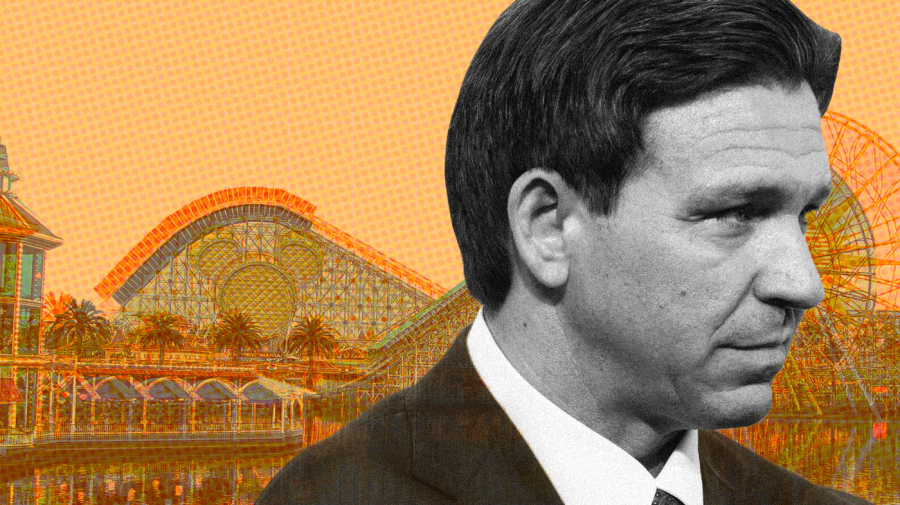Whispers are growing louder among Republicans that Florida Gov. Ron DeSantis (R) has miscalculated in his battle with Disney — a struggle that has already gone on for more than a year and has no end in sight.
There are real dangers, they say, of his fight with the corporation becoming a distraction from his likely presidential campaign — and one that could make him seem petty and vindictive rather than strong or decisive.
Despite the fact many polls suggest GOP voters are sympathetic to DeSantis’s war on “wokeness” in general, there are also concerns among conservatives about a powerful elected official targeting a specific company for political reasons.
People close to former President Trump, DeSantis’s archrival if he should enter the 2024 race, are gleefully fanning those concerns.
“If you are allowing governors to dictate their own politics to private businesses, what is to stop a liberal governor from doing the same?” asked one source familiar with the former president’s thinking.
The Trump source complained about governors who “overstep their authority for their own political validation,” adding, “The conservative media attacked Gov. [Andrew] Cuomo and Gov. [Gretchen] Whitmer for doing the same thing during the lockdowns. You can’t have it both ways.”
Such commentary is not confined to pro-Trump circles, either.
One Republican strategist not aligned with any declared or likely 2024 candidate said that while it is true conservatives have “issues” with Disney, they also have “issues with government picking winners and losers.”
On a practical level, the strategist added: “I think DeSantis first got on the national radar by getting in a fight with Disney. I think his problem now is that he has to win it — and it is not clear that he can continue upping the ante.”
The latest twist in the long-running DeSantis-Disney saga came on Wednesday when the corporation sued DeSantis in federal court in Florida.
The company’s filing alleged “a targeted campaign of government retaliation” that it said had been “orchestrated” by DeSantis.
The alleged campaign, Disney contended, “threatens Disney’s business operations, jeopardizes its economic future in the region, and violates its constitutional rights.”
DeSantis, who has been on an international trade mission in recent days, responded from Israel. At a news conference, he argued that the Disney suit was “political” and had no “merit.”
The governor further argued that Disney was seeking special treatment in his state and was “upset that they are actually having to live by the same rules as everybody else.”
But now, DeSantis faces the prospect of being mired in a protracted legal struggle even as he is perceived to be making moves toward launching a presidential candidacy.
The Disney saga has its roots in the Florida legislation passed with DeSantis’s support last year that prohibited teaching about gender identity or sexual orientation through the third grade.
The legislation, tagged somewhat hyperbolically as the “Don’t Say Gay” bill by critics, caused national controversy. Within weeks of its passage, Disney issued a statement expressing its opposition, adding that the bill “should never have been signed into law.”
DeSantis fired back in short order, moving to strip Disney of the significant level of autonomy it enjoyed in the area where Walt Disney World is.
Then, there were further squabbles earlier this year over the makeup of the five-person board that runs the district.
DeSantis, with the backing of Florida Republicans, sought to appoint his own board. But the outgoing board then tried to outmaneuver him by making agreements at its last meeting that would have greatly constrained their replacements.
Earlier this month, DeSantis went even further, suggesting the state might build a prison near Disney’s theme parks, presumably as a means of exacting retribution.
A Reuters/Ipsos poll released earlier this week found a clear majority of Republicans favoring DeSantis’s basic position but a significant majority dissenting.
Sixty-four percent of Republicans said DeSantis was “rightfully rolling back special treatment for Disney,” but 36 percent said he was “punishing Disney for exercising their right to free speech.”
Worryingly for the Florida governor — especially if he ever became the GOP nominee for president — independents broke heavily against him on that question, contributing to strong sympathy for Disney among the population at large.
Moreover, although 44 percent of Republicans said they had a more positive view of DeSantis because of the controversy, 19 percent said they had a more negative view.
In potentially even worse news for DeSantis, majorities of Democrats, Republicans and independents said they would be less likely to vote for a candidate who “supports or passes laws designed to punish a company for its political, social or cultural stances.”
The escalation of the controversy with Disney also comes as DeSantis has endured a bad time in his quasi-campaign, falling further behind Trump in the polls and having to mop up an assertion that the Ukraine-Russia war is a mere “territorial dispute.”
There will, of course, be many twists and turns in the presidential campaign, which will not see its first debates until August. No votes will be cast until early next year.
Still, for now, there is no sign that DeSantis’s battle with Disney is letting up anytime soon. And that could be a hindrance, at a minimum, if a presidential campaign gets underway in earnest.
“It’s just the fiercest legal tug-of-war between two titans in our state that we have seen, maybe in our lifetimes,” said Susan MacManus, a University of South Florida professor emerita and a prominent commentator on politics in the state.
“There are no holds barred, and neither side is blinking.”
The Memo is a reported column by Niall Stanage.

